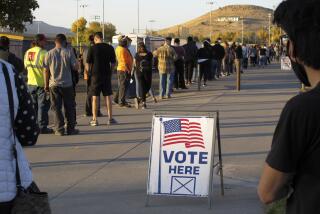Happy Presidents’ Day (or Uniform Holiday No. 3)
- Share via
As a vacationing nation prepares to ignore Monday’s Presidents’ Day, we would do well to consider how a once venerable holiday reached such a slough of meaninglessness. The culprit is the Uniform Holiday Act of 1968, which provided that beginning in 1971, Memorial Day, Columbus Day, Veterans Day, and Washington’s Birthday (later demoted to the beloved “Presidents’ Day”) were to fall only on Mondays.
For years, Florida Sen. George A. Smathers crusaded for the three-day weekend. The eminently practical Smathers even wanted to junk Thanksgiving Thursday and transplant the Fourth of July.
The Monday holiday bill found its weightiest ally in the U.S. Chamber of Commerce. The chamber’s arguments for uprooting the old holidays were no more elevated than the bottom line:
* It would reduce absenteeism; no more calling in sick on Friday after a wild Memorial Day Thursday.
* Production would not experience midweek disruptions.
* Travel-dependent industries would prosper.
When the bill came to the House floor in May 1968, shrewd supporters had tacked on a provision establishing Columbus Day as a national holiday. This ensured the measure’s passage, despite the futile effort of Illinois Republican Edward Derwinski to rename Columbus Day “Discoverers of America Day” as a way to also honor Polish explorer Jan Z. Kolna and “put an end to the Polish jokes which have swept the country.”
The Daughters of the American Revolution “vigorously protest[ed] this downgrading of our national heroes,” but the white-haired bluebloods were no match for Chamber of Commerce greenbacks.
Illinois Republican Robert McClory gamely conjectured that families would spend the long weekends visiting Arlington National Cemetery, Gettysburg and other “famed battlegrounds and monuments,” including, presumably, the Tomb of the Unknown Shopper.
New York Rep. Samuel Stratton, self-proclaimed “father of Monday holiday legislation” declared that three-day weekends would “refresh and restore the spirits and the energies” of federal employees.
The bill’s cantankerous opponents were not impressed. Michigan’s Edward Hutchinson called it “a rejection of our historic past”; North Carolina’s Basil Whitener grumbled that “a few business organizations would make more profit on Mondays” at the expense of “the tradition and background of our nation. Let us not peg everything to the dollar.”
Rep. Joe Waggoner of Louisiana thundered, “Holidays and commemorative events were not created for the purpose of trade or commerce.” The intrepid Waggoner, whose district must have had mighty few Knights of Columbus, even took aim at Mr. 1492: “I think it needs to be said since we seem to be so proud of Columbus, that when he left for this country he did not know where he was going, and when he got here, he did not know where he was, and when he got back, he did not know where he had been.”
The traditionalists had a monopoly on wit. Fletcher Thompson of Georgia offered an amendment to rename our holidays “Uniform Holiday No. 1, Uniform Holiday No. 2,” etc.
The Uniform Holiday Act of 1968 passed the House, 212 to 83, and the Senate by voice vote. “This is the greatest thing that has happened to the travel industry since the invention of the automobile,” rejoiced the president of the National Assn. of Travel Organizations.
Tennessee’s Dan Kuykendall saw it differently: “If we do this, 10 years from now our schoolchildren will not know what Feb. 22 means. They will not know or care when George Washington was born. They will know that in the middle of February they will have a three-day weekend for some reason. This will come.”
This has come.
More to Read
Sign up for Essential California
The most important California stories and recommendations in your inbox every morning.
You may occasionally receive promotional content from the Los Angeles Times.










